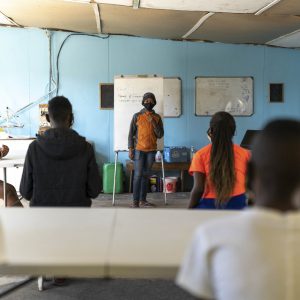Threat to early childhood development sector
A number of early childhood development centres have been forced to close because of Covid-19, resulting in a bleak present and future for the many children who depend on them.
Author:
24 November 2020

The country’s often overlooked but critical early childhood development (ECD) centres have been brought to their knees by Covid-19. And should there be a strong second wave of infections, the devastation will be worse.
These centres provide children with vital opportunities for early learning. They also get access to nutritious food and activities that enhance their physical, emotional and cognitive skills. In a sense, ECD centres look after the children’s educational needs as well as their general wellbeing. An ECD centre could be a crèche, a daycare centre for young children, a playgroup, a preschool, or an after-school care facility.
ECD centres fall under the jurisdiction of both the Department of Basic Education and the Department of Social Development, and must be formally registered to meet guidelines set down by the government.
After the Covid-19 pandemic was declared a national disaster in March and a lockdown subsequently imposed, all ECD centres had to close temporarily for the safety of the children. While sensible, the move instantly deprived children of much-needed education as well as nutritional meals – for many the only source of reliable nutrition on any given day. But most of all, the ECD centres were deprived of operational subsidies from the government, a source of great contention.
Thokozile Fumhe, 47, the principal at Aspiring Graduates in Reiger Park in Boksburg, was unable to pay full salaries and rent. “I don’t know how long the landlord will allow me to operate and how long the staff will be patient with the small amount they are receiving. Until then, I will keep Aspiring Graduates’ doors open, doing what I love: educating the little ones,” Fumhe says.
Trying to survive a pandemic
Fumhe’s ECD centre, which started in 2016, is in the process of registering with the social development department. It employs four practitioners and has 78 children ranging from three months to six years old. School fees cost R700 per child and practitioners get a stipend ranging between R1 900 and R3 000. The money collected from school fees pays for rent, water, electricity and other operational costs.
But when the centre reopened on 31 August following the partial lifting of the lockdown, Fumhe says only 34 children returned. The centre is open Monday to Friday, from 6:30am to 5:30pm. She says only a handful of parents can afford the fees and some have asked to pay less. “They [parents] have been laid off from work and others cannot afford fees because of pay cuts.”
Aspiring Graduates received no help from the social development department during the lockdown, not even for things like personal protective equipment and sanitisers. “Fortunately, I had food supplies in the cupboards, and the school has been surviving on that.” The food supply comes from a nutrition subsidy that the centre received last year. Early this year, she was told the department was waiting for more children to attend before distributing any funds.
Related article:
Tanya Potgieter, 49, is another disheartened ECD principal. She runs two centres: Happy Hearts Junior Academy and Happy Hearts Senior Academy, both of which are in Elsburg, Germiston, and have been running for almost nine years.
There are a total of 22 staff members, including support staff. Between the two centres, they cater to children from three months to those in grades R to 7 who need after-school care. Fees range from R775 to R1 400 a month, and the salaries for the workers are between R4 500 and R10 000 a month. Before the lockdown, Potgieter’s centres had 280 children.
At present, only 159 children attend and fewer parents are paying fees. “We wrote off hundreds of thousands of rands in fees that were invoiced but never paid… My bank gave me a loan, and that helped to carry the running expenses like rates and taxes, water and lights, insurances and staff salaries,” Potgieter says.
Her financial loss because of the health crisis resulted in some of her staff members losing their jobs. “Reduced numbers of children caused reduced income,” she says. “Many of my staff are still temporarily laid off and others have been retrenched.”
A costly lack of political will
With a general fear of a second wave of the pandemic erupting across the country, this bleak picture of ECD centres might worsen in months to come. Many experts in the education sector feel the government’s response could have been more decisive.
Eric Atmore, director of the Centre for Early Childhood Development and an associate professor in education policy studies at Stellenbosch University, says more than half of the country’s 32 000 ECD centres have not been able to reopen, even at level one of the lockdown. “This means that about one million vulnerable children have not been able to get the daily nutritious meal that they need, nor the early learning opportunities for the duration of the lockdown.”
Atmore says ECD centres are critical to a young child’s progress in the formal school system, and attending a good quality centre enhances the early literacy skills of young children. “Not being in ECD centres impacts young children, especially children who are vulnerable. At the ECD centre young children socialise, they read stories, recite rhymes and speak with other children.”
Also, children who miss the foundation phase do not develop properly. “Not being at an ECD centre certainly impacts language development, but also cognitive development. Together with not receiving a nutritious meal at the ECD centre [and] playing in unsafe communities where violence is very prevalent, this impacts child wellbeing very much.”
Despite their critical role, some ECD centres have been forced to permanently close owing to a lack of resources. Unlike other industries, the ECD sector never received any Covid-related financial relief from the government. As a result, a nationwide peaceful protest was held. Minister of Social Development Lindiwe Zulu and eight provincial members of the executive were accused of violating children’s constitutional right to life, nutrition, social services, education and enhancement of education by withholding the subsidies for indigent nursery schools.
Related article:
When Zulu did not respond positively to the sector’s demands, various civic society organisations took the matter to the high court in Pretoria. The Western Cape was spared the court action because it had run kitchens at ECD centres during the lockdown. Judge Nicolene Janse van Nieuwenhuizen ruled in favour of ECD centres receiving backdated subsidies if they had a service level agreement with the government. The court order also covered those who could not sign this agreement during the lockdown.
The ECD sector has welcomed the judgment that will see centres receive backdated payments. But Atmore believes the government must do better in supporting them. “This political will has been missing for two decades now and continues to be missing with the government paying lip service to child rights.”
Atmore says the government acted improperly when it failed to provide support to ECD centres. “The performance of the [Department of Social Development] during Covid-19 has been shockingly inappropriate and immoral… and it has gone against all aspects of social justice.
“South Africa can move forward concerning its youngest and most vulnerable young children when the government makes early childhood development a priority. The only way to do this is to ensure sufficient funding from the National Treasury to ECD centres,” says Atmore.
Hanging in the balance
A study of the lockdown’s impact on the future of ECD centres in South Africa conducted by Gabrielle Wills, a socio-economic policy researcher based at Stellenbosch University, Jesal Kika-Mistry, a PhD candidate with the same institution, and Janeli Kotzé of the Department of Basic Education, concluded: “The threat of ECD programme closures across the nation will have an impact beyond ECD operators, [affecting] the lives of millions of children, millions of households and millions of adults who rely on these ECD services.”
The writers urge the government to act quickly to save ECD centres by, among other things, offering financial assistance. “While the provision of subsidies only reaches registered centres – with unregistered centres far outnumbering those that are registered – these subsidies are likely to go a long way in covering some income gaps. All irregularities in the payment of subsidies must be resolved immediately.”
How the Department of Social Development plans to save the ECD centres from possible closure should there be a second wave of the pandemic remains unclear. It had not responded to questions by the time of publishing.


